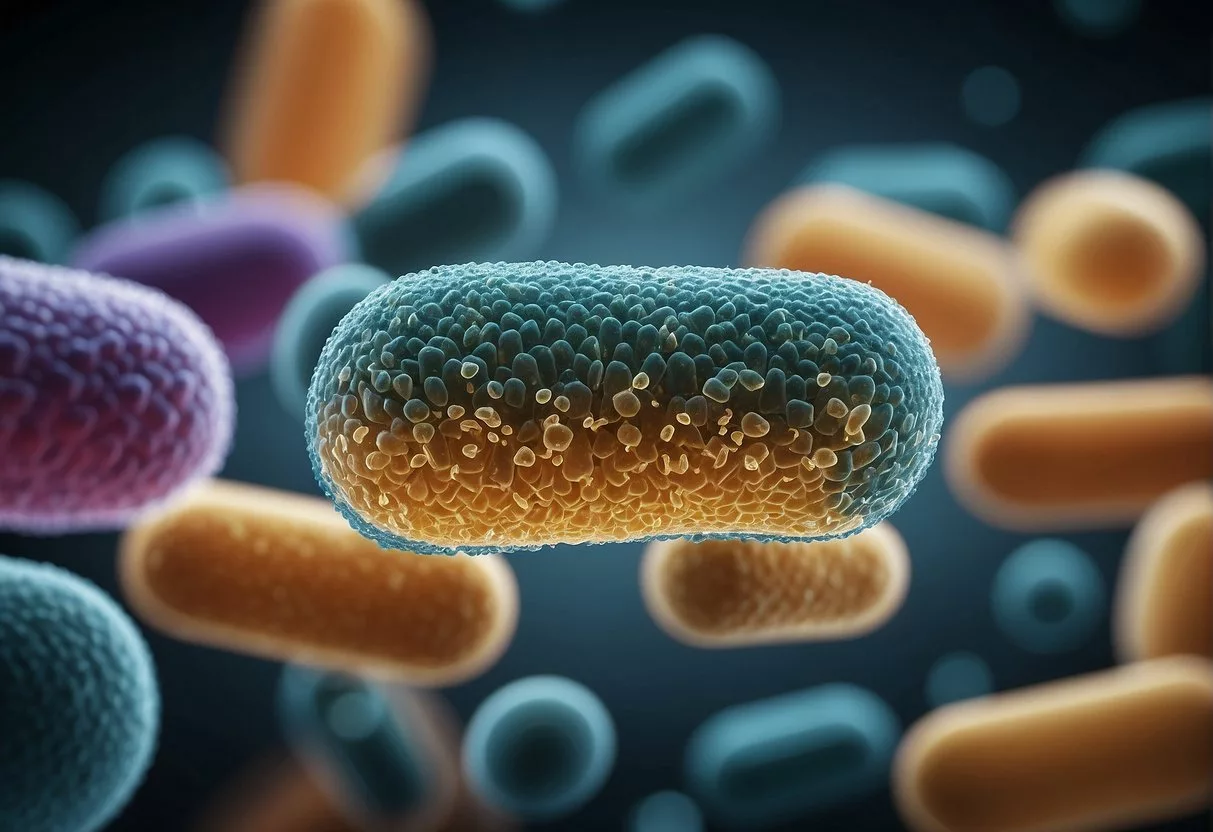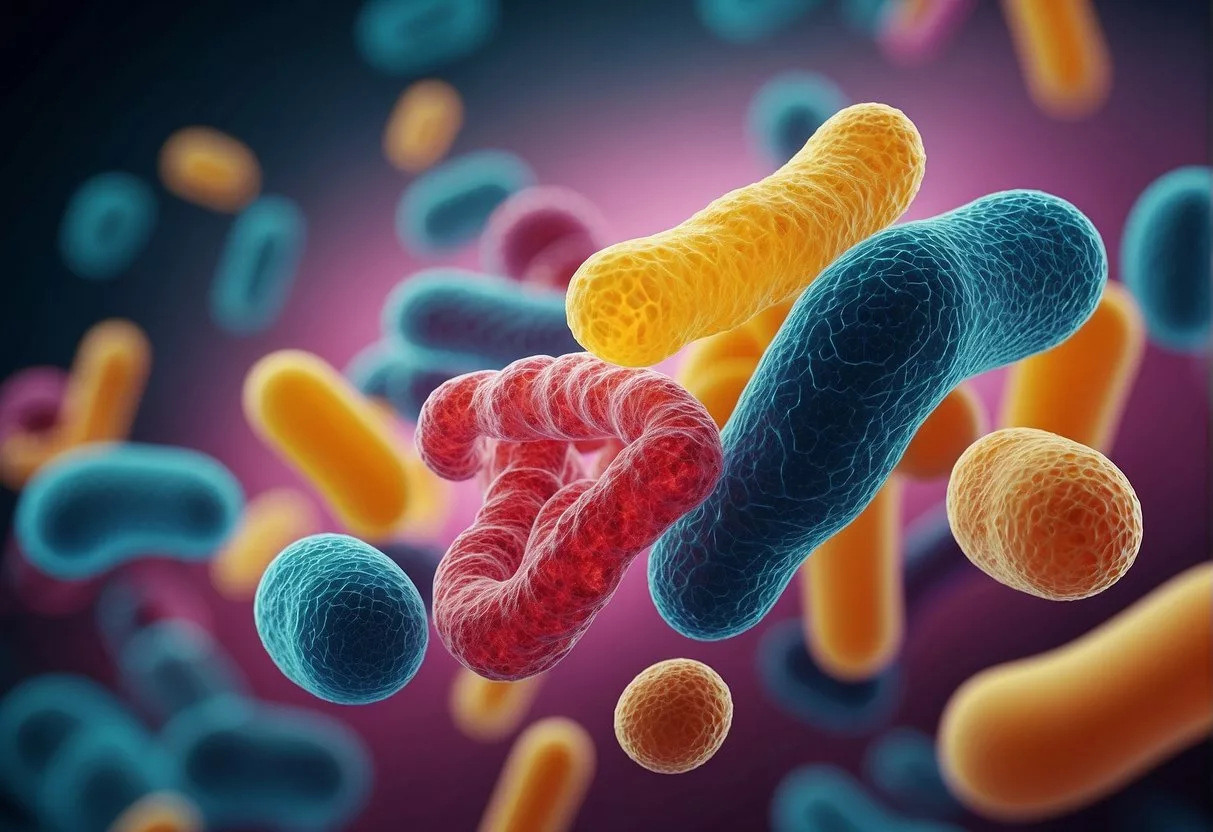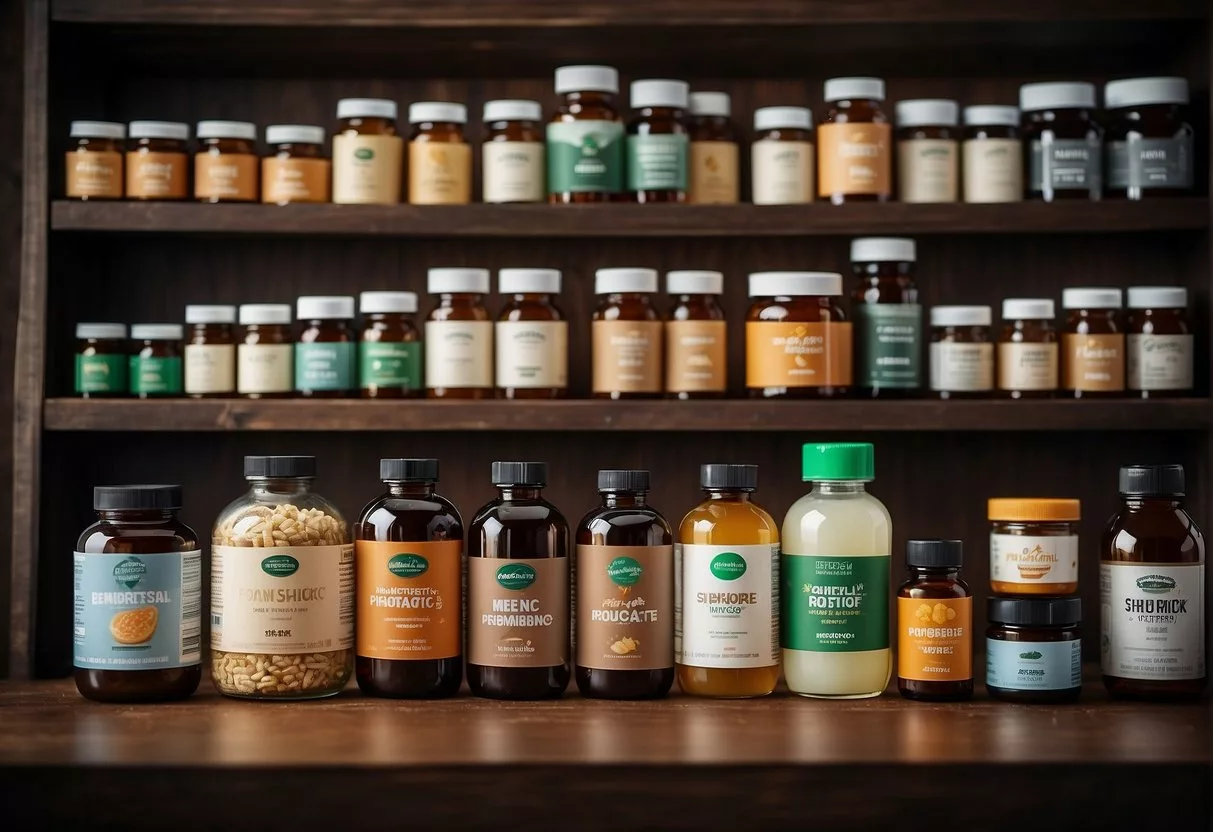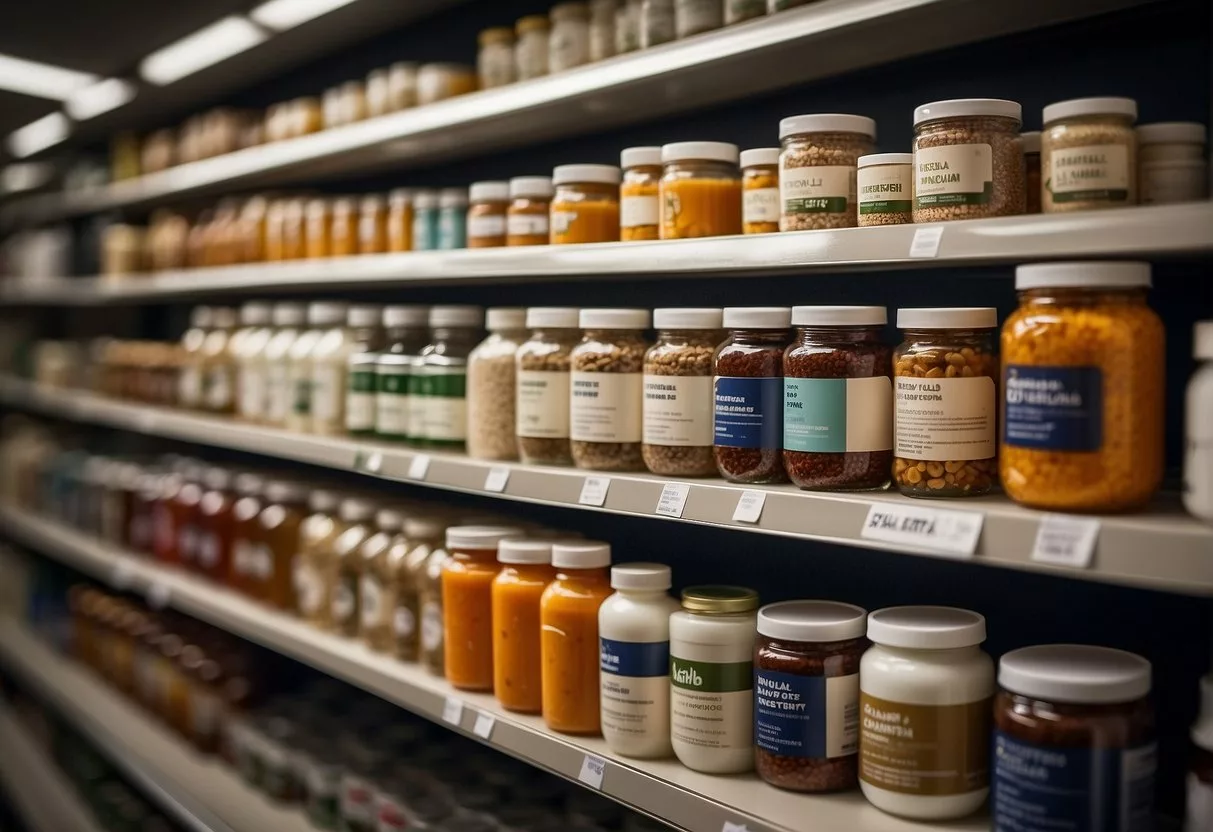In men’s health, probiotics play a crucial role by contributing to a balanced gut microbiome, which is vital for various bodily functions.
The specific strains and formulations necessary can differ from person to person, but for men, probiotics may offer tailored health benefits including support for immune function, nutrient absorption, and even mental well-being.
Selecting the right probiotic supplement is key to obtaining these potential health benefits.
With a vast range of products on the market, men are faced with various options that cater to different dietary needs, health goals, and preferences.
Quality, strain variety, and the ability to survive stomach acid to reach the intestines are all important factors.
Futhermore, incorporating probiotics into one’s diet isn’t just about taking a supplement. It also involves understanding how dietary choices can influence the effects of probiotics and how they interact with the existing gut flora.
Key Takeaways
- Probiotics contribute to men’s health by supporting gut balance and overall well-being.
- Choosing the right probiotic involves considering quality, strain specificity, and survival rate through the digestive system.
- A holistic approach to probiotic integration into the diet can amplify their health benefits.
Specifics for Men

Probiotics can impact several aspects of wellness, and for men, they offer particular benefits for digestive and overall health. Understanding how probiotics cater to men’s unique physiological needs is crucial for achieving optimal health outcomes.
Probiotics and Male Digestive Health
Probiotics for men are formulated to support a healthy digestive system, which can be prone to issues like Irritable Bowel Syndrome (IBS), constipation, and diarrhea.
Certain strains of probiotics, such as Lactobacillus and Bifidobacterium, have been shown to improve these gastrointestinal issues.
They contribute to a balanced gut microbiota, facilitating regular bowel movements and alleviating common digestive discomfort.
Common digestive concerns for men:
- IBS: Probiotics help in managing IBS symptoms, which can include abdominal pain and altered bowel habits.
- Constipation: Regular intake of probiotics can help maintain digestive regularity.
- Diarrhea: Some probiotic strains are effective in reducing the duration and frequency of diarrhea.
Probiotics and Other Aspects of Men’s Health
Beyond digestion, probiotics can play a role in various other health areas for men. Probiotic supplements or foods might enhance immunity, support prostate health, regulate testosterone levels, and assist in weight management.
- Fertility: Probiotics may have a positive effect on male fertility by enhancing sperm motility.
- Prostate Health: Certain probiotics are suggested to contribute to prostate wellbeing, potentially reducing the risk of common issues like benign prostatic hyperplasia.
- Testosterone Levels: While direct links are still under study, a well-balanced microbiome may influence hormone levels, including testosterone.
- Immune Function: A strong immune system is supported by a healthy gut, where a large proportion of the body’s immune cells are located.
- Weight Loss: Probiotics can influence weight loss and management by impacting metabolism and appetite regulation.
Choosing the Right Probiotic

When selecting a probiotic, men should focus on the specific strains of probiotics and the colony-forming units (CFUs) to assess their potency and potential effectiveness for particular health goals.
Types of Probiotic Strains for Men
Lactobacillus and Bifidobacterium are two of the most widely recognized genera that are beneficial for men’s health. Within these groups, certain strains stand out:
- Lactobacillus acidophilus: Supports nutrient absorption and may help with lactose digestion.
- Bifidobacterium longum: Known to reduce gastrointestinal discomfort and improve the immune system.
Additionally, the Bacillus genus, with strains such as Bacillus coagulans, provides support for digestive health and can survive stomach acid to reach the gut effectively.
Evaluating CFUs and Probiotic Effectiveness
The effectiveness of a probiotic is often measured by the number of viable bacteria it contains, which is denoted in CFUs.
For men, a probiotic supplement should typically have a CFU count in the range of:
- 5 billion to 100 billion CFUs: This range is considered effective for maintaining everyday digestive health.
It is essential to note that higher CFU counts are sometimes required for specific therapeutic effects. Men should ensure that the product specifies CFUs at the time of expiration, as this guarantees the bacteria’s viability throughout its shelf life.
Integrating Probiotics into Diet

Incorporating probiotics into one’s diet involves choosing the right foods and supplements to support digestive health. Men can access the benefits of probiotics through a variety of dietary options.
Fermented Foods and Natural Sources
Fermented Foods: A range of probiotic-rich foods offer natural ways to boost gut health.
Yogurt is a staple in probiotic diets, delivering live cultures essential for gut health. Men should look for yogurts with “live and active cultures” listed on the label.
Kefir, a fermented milk drink, combines bacteria and yeast in a matrix of proteins, lipids, and sugars.
- Sauerkraut and Kimchi: These fermented vegetables are not only rich in probiotics but also high in vitamins and fiber.
- Miso and Tempeh: These soybean-based products are common in Asian cuisine and provide a plant-based probiotic boost.
Incorporating these foods into meals can be as simple as having yogurt for breakfast, using kefir in smoothies, adding sauerkraut to sandwiches, or preparing soups and stir-fry dishes with miso and tempeh.
Supplementation Options
Probiotic Supplements: For individuals seeking more targeted probiotic intake or those with dietary restrictions, supplements can be an effective alternative.
They come in various forms, like capsules and tablets, each containing different strains and amounts of probiotics.
- Capsules and Tablets: These provide specific strains of probiotics in concentrated doses. They are available over-the-counter and can be found at health food stores or online.
Health Benefits of Probiotics

Probiotics carry an array of health benefits for men, focusing significantly on enhancing gut health and immune response, alongside potential improvements to mental well-being and mood regulation.
Gut Health and Immunity
Probiotics are beneficial bacteria that play a critical role in maintaining gut health. They help balance the gut microbiota, which is essential for proper digestion and absorption of nutrients.
A healthy gut biome also supports the immune system by preventing the growth of harmful bacteria and producing natural antibiotics to combat pathogens.
Studies referenced by Forbes Health suggest that probiotics can lower systemic inflammation, a known risk factor for numerous chronic diseases.
Probiotics and Mental Well-being
The connection between the gut and the brain, often referred to as the gut-brain axis, reveals that gut health can influence brain function and mood.
Probiotics may contribute to mental well-being by moderating stress response and potentially improving sleep quality. Medical News Today highlights specific probiotic strains that have been studied for their effects on mood, suggesting links to reduced anxiety and depression symptoms.
Additionally, emerging research hints at the positive influence of probiotics on cognitive functions and mental clarity.
Probiotic Safety and Considerations

When integrating probiotics into a daily regimen, men should note their potential side effects and the importance of consulting healthcare professionals for individualized advice.
The appropriateness and safety of probiotics can vary based on one’s health status and any concurrent medications.
Understanding Side Effects
Probiotics are generally considered safe for most individuals; however, they can cause some side effects. Common ones include diarrhea, gas, and bloating.
These side effects are typically mild and temporary as the body adjusts. The National Center for Complementary and Integrative Health advises that side effects tend to reduce after the initial consumption period.
In rare cases, probiotics can cause more severe side effects such as an allergic reaction. These are more likely to occur in people with immune system issues or those who have severe underlying health conditions.
Always check labels for allergen information to avoid preventable reactions.
When to Consult a Doctor
Consultation with a doctor is advised if side effects persist or if you have a pre-existing condition such as inflammatory bowel disease.
It’s also crucial to speak with a healthcare provider before using probiotics to help manage specific health issues, including antibiotic-associated diarrhea.
Individuals taking immunosuppressive medication or with weakened immune systems should talk to their doctors as probiotics could increase the risk of infections.
Additionally, the FDA does not rigorously regulate supplements in the same manner as prescription medications, so one must always confer with a healthcare provider regarding the quality and safety of a probiotic supplement.
Probiotic Quality and Selection

Selecting the right probiotic involves understanding the importance of quality assurance through labeling and third-party testing, as well as knowing the proper storage requirements to ensure product efficacy.
These factors are critical to guaranteeing that the probiotics men choose will provide the intended benefits.
Labeling and Third-Party Testing
When evaluating probiotics, labels should be scrutinized for the strains and number of colony-forming units (CFUs).
A detailed label offers transparency and reflects the manufacturer’s confidence in their product.
Moreover, third-party testing is paramount; it provides an unbiased confirmation of the probiotic’s quality, potency, and purity.
Labels boasting third-party testing certifications indicate that the product meets stringent quality standards.
For instance, the presence of a Certificate of Analysis (COA) ensures that what’s on the label reflects what’s in the bottle.
- Look For:
- Detailed label including strain information and CFU count.
- Certifications or mentions of third-party testing on the label.
Storage and Shelf Life
Storage requirements like refrigeration can influence the viability of the probiotics.
Some probiotics need to be kept in the fridge to maintain their efficacy, while others are shelf-stable due to sophisticated freeze-drying processes.
It’s critical to check the label for storage instructions to maximize the product’s shelf life.
Additionally, an explicitly stated shelf life is indicative of a manufacturer’s commitment to quality.
- Check Labels For:
- Specific storage instructions.
- Clearly stated shelf life information.
Manufacturers who invest in ensuring product stability through proper storage solutions indicate a dedication to delivering a high-quality product.
The Role of Prebiotics and Synbiotics

The modulation of gut microbiota is gaining importance with the recognition that dietary components like prebiotics and the use of synbiotics play critical roles in digestive health.
Enhancing Probiotic Effects with Prebiotics
Prebiotics are often non-digestible fibers such as oligosaccharides that act as food for probiotics.
By selectively stimulating the growth and activity of beneficial bacteria in the gut, they enhance the efficacy of probiotics.
This dietary fiber helps maintain a healthy intestinal environment, which is crucial for a balanced microbiota.
Combining Probiotics and Prebiotics in Synbiotics
Synbiotics refer to nutritional supplements combining probiotics and prebiotics in a form of synergism, hence the name Synbiotic.
They are designed to improve the survival and adherence of beneficial microorganisms in the gut.
Products like Ritual Synbiotic+ and DS-01 Daily Synbiotic showcase this combination, targeting both the provision of probiotics strains and the oligosaccharide-based fibrous nutrients that support them.
Synbiotics may offer comprehensive benefits, including promoting nutrient absorption and supporting the immune system.
Probiotic Products and Reviews

In assessing the best probiotics for men, the focus lies on the effectiveness and composition of the supplements. This section provides a closer look into recommended products and breaks down their ingredients to understand the benefits they may offer for men’s health.
Top Probiotic Supplements for Men
- Jarrow Formulas Jarro-Dophilus EPS: This high-potency probiotic supplement is designed to boost intestinal health and immunity. It includes a range of bacterial strains such as Lactobacillus acidophilus and Bifidobacterium lactis, which are beneficial for gastrointestinal wellbeing.
- Garden of Life Once Daily Men’s: Tailored for men’s needs, this supplement offers 50 billion CFU and 15 probiotic strains. Key strains include Lactobacillus acidophilus and Bifidobacterium, aimed at supporting digestive and colon health.
- Florastor Daily Probiotic Supplement: Unlike many other probiotics, Florastor contains Saccharomyces boulardii, a yeast probiotic known for its resilience and ability to support a healthy gut barrier.
- Culturelle Men’s Daily Health: It combines the power of Lactobacillus rhamnosus GG, which has been widely researched, and is known to survive harsh stomach acids ensuring it reaches the intestines.
- Persona Daily Probiotic: Offers a blend that includes Bifidobacterium lactis and Lactobacillus acidophilus, promoting gut health and supporting the immune system.
- Care/of Probiotic Blend: This supplement contains both Saccharomyces boulardii and bacterial probiotics, aimed at comprehensive gut health support.
Analyzing Product Ingredients and Efficacy
Ingredients: A common efficacy marker for probiotics is the presence of well-researched strains.
Lactobacillus acidophilus is heavily featured for its ability to improve digestion and enhance immune function.
Bifidobacterium lactis is another significant strain known to regulate bowel movements and alleviate stomach discomfort.
Saccharomyces boulardii, a non-bacterial probiotic, offers unique properties, including the prevention of antibiotic-associated diarrhea and protection against intestinal pathogens.
Efficacy: The documented efficacies of strains like Streptococcus thermophilus and Escherichia coli Nissle 1917, which are less common but have clinical data to support their use in gastrointestinal health, are seen as promising.
A complete probiotic supplement for men would ideally feature a combination of these strains to cater to a wider range of gastrointestinal health needs.
Frequently Asked Questions

In this section, you will find concise answers to common queries regarding probiotics and their benefits for men, specifically tailored to address concerns about age, hormonal balance, weight management, overall health, and digestive wellness.
What are the top recommended probiotics for men over 50?
For men over 50, probiotics like Garden of Life RAW Men are often recommended, as they contain a tailored blend of strains suitable for the needs of this age group.
How do probiotics influence testosterone levels in men?
Probiotic strains may have an indirect role in hormonal balance. They aid in the absorption of nutrients, which, in turn, can support the body’s natural production of testosterone.
Can probiotics be effective for men’s weight loss, and which ones are best?
Certain probiotics are suggested to help with weight management. Strains like Lactobacillus gasseri have been associated with a reduction in belly fat and overall weight.
Which probiotics are considered most effective for overall men’s health?
For overall men’s health, multi-strain products like Bio-Kult Advanced Probiotic Supplements are often considered effective for maintaining a healthy gut microbiome.
Is it beneficial for men to include probiotics in their diet?
Yes, including probiotics in the diet is beneficial for men as it can support digestive health, nutrient absorption, and immune system function.
What are the best probiotics for improving gut health and reducing bloating in men?
Strains like Lactobacillus acidophilus and Bifidobacterium lactis are known for improving gut health and reducing bloating.
Supplements with a broad range of strains may offer comprehensive benefits.